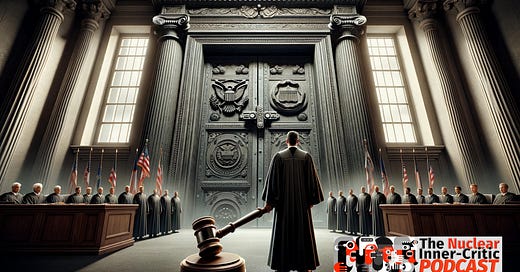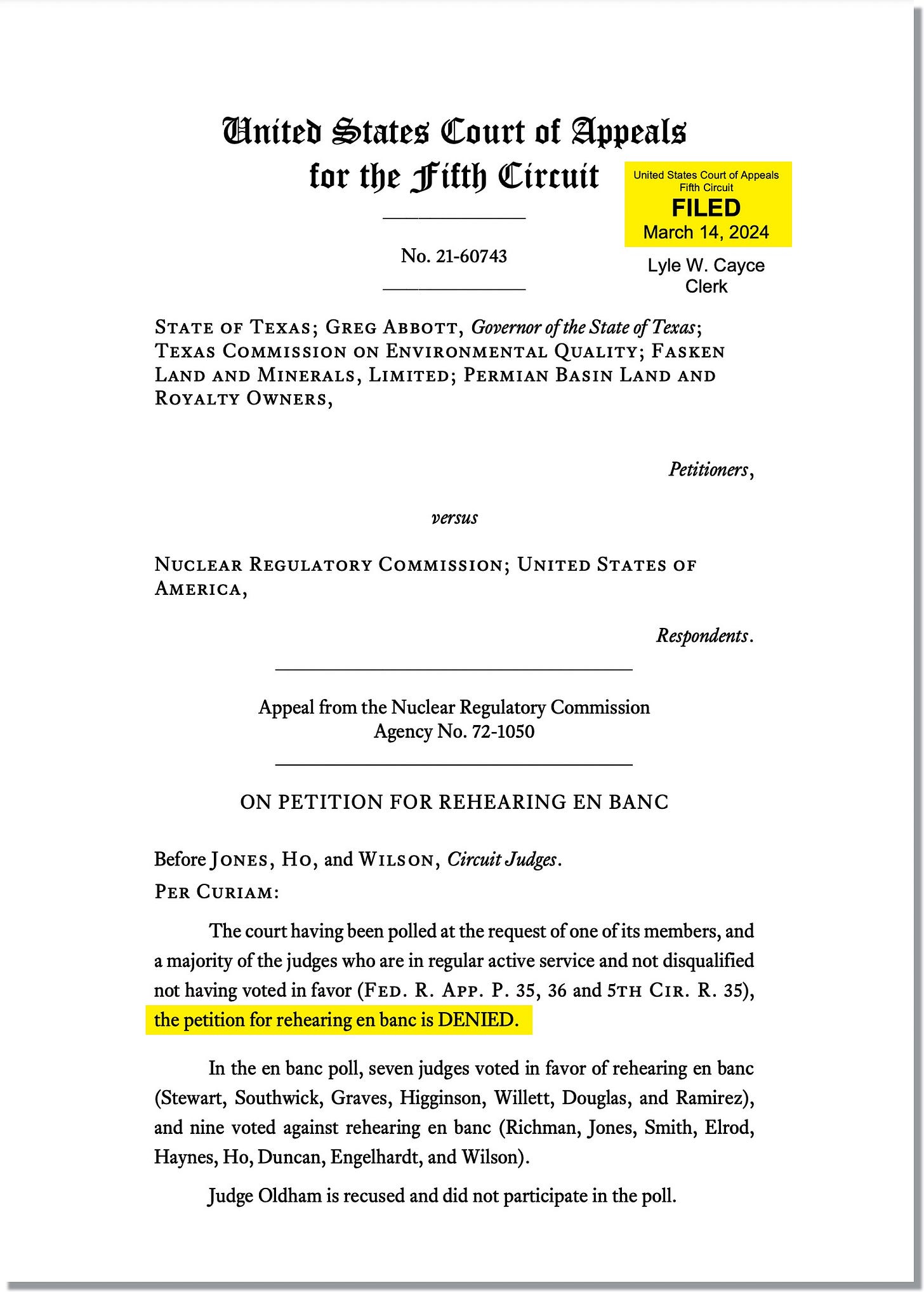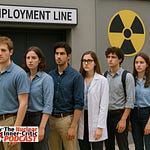TL;DR:
5th Circuit denies en banc rehearing, upholds decision voiding NRC license for private nuclear waste storage facility in Texas
Ruling reaffirms Atomic Energy Act doesn't authorize NRC to override host state objections, upholds NWPA's consent-based siting framework
As a former Texas official, I believe the decision, while a setback, is an opportunity to refocus on NWPA's established process
The Court clearly signals any path forward must involve enticing volunteer host communities with NWPA's incentives and benefits
Policymakers and industry must redouble efforts on local trust-building and negotiation, the proven formula for success
Ruling is a reminder: no shortcuts around states' rights and consent-based siting for nuclear waste facilities
Executive Summary
The 5th Circuit Court of Appeals has denied an en banc rehearing of its landmark decision voiding the Nuclear Regulatory Commission's (NRC) license for a private consolidated interim storage facility in Texas. The ruling reaffirms that the Atomic Energy Act does not authorize the NRC to unilaterally license such facilities over the objections of host states, upholding the rights of affected communities enshrined in the Nuclear Waste Policy Act (NWPA). As a former Texas state official with decades of experience on nuclear waste issues, I believe this development, while a setback for the industry, is an opportunity to refocus efforts on the NWPA's consent-based framework. By clearly reaffirming the rules of engagement, the court has signaled that any viable path forward must flow through the law's established process of enticing volunteer host communities and states with incentives and benefits. Policymakers and stakeholders must now redouble efforts to use the NWPA's participatory tools as intended, embracing the hard work of local trust-building and negotiation. The 5th Circuit's ruling is a reminder that there are no shortcuts around states' rights and the painstaking but proven formula of securing consent-based siting for nuclear waste facilities.
The Story
In a major development for nuclear waste policy, the 5th Circuit Court of Appeals has denied an en banc rehearing of its earlier decision, voiding a Nuclear Regulatory Commission license for a private consolidated interim storage facility in Texas. The court's move solidifies its landmark ruling that the Atomic Energy Act does not authorize the NRC to unilaterally license such facilities over the objections of host states.
As a former Texas state official who spent 15 years working to secure local and state approval for responsible nuclear waste disposal, I applaud the 5th Circuit for upholding the rights of affected communities enshrined in the Nuclear Waste Policy Act.
The law's provisions ensuring states can reject unwanted facilities and receive federal benefits for hosting them are the cornerstones of the consent-based siting process that is critical for forward progress on this challenging issue.
THOUGHTS ON “OTHER VOICES”
Luse's Newsweek article oversimplifies the complex challenges of nuclear waste disposal, ignoring the legitimate concerns of states and communities. His call to reform the NWPA to give the DOE freer rein in siting storage facilities would undermine the law's essential consent-based framework. Luse dismisses the decades of failed top-down efforts to force a repository on an unwilling Nevada, which the 5th Circuit ruling rightly rebuked. Rather than empower Washington bureaucrats, reforms should focus on using the NWPA's existing tools to incentivize and negotiate with potential host communities. Luse's criticism of states' nuclear moratoriums as driven by misguided renewables advocacy overlooks their valid apprehension about becoming de facto waste dumps without consent. His glib comparison of spent fuel to ordinary garbage collected by Waste Management trivializes the gravity of the issue. Ultimately, Luse's industry-centric view neglects the hard-learned lessons that there are no shortcuts around states' rights and public buy-in.
Wald's Nuclear Newswire article, while providing a detailed overview of the challenges surrounding nuclear waste disposal, ultimately fails to grapple with the fundamental importance of consent-based siting enshrined in the Nuclear Waste Policy Act (NWPA). His framing of the issue as a simple lack of "cooperation" and his quip that there are still "45 states to go" trivializes the hard-learned lessons that top-down siting efforts are doomed to fail without genuine buy-in from host communities and states. Wald's discussion of costs borne by taxpayers and utilities, while important, neglects the real human impact on communities that have become unwilling de facto waste sites with no recourse. His treatment of "consent" as an abstraction to be puzzled over, rather than a clear statutory requirement, is concerning. And his breezy suggestion that offering cash to states is akin to dressing up an "initially unattractive bride" is troublingly flippant. Ultimately, while identifying some key political obstacles, Wald seems insufficiently attuned to the NWPA's essential insight - that there are no shortcuts around the difficult work of consent-based siting, as the 5th Circuit has rightly reaffirmed.
In denying the NRC and nuclear industry's petition for rehearing, the 5th Circuit has sent an unmistakable message that the NWPA's careful balance between federal and state authority in nuclear waste management is not to be disturbed. Private consolidated storage, while a desirable tool for reducing costs and enhancing safety, cannot override the right of host states to have a meaningful say in the process.
This development is a setback for those in the industry, like myself, who have labored for years to break the nation's nuclear waste logjam.
But pursuing centralized storage in tension with the NWPA was always a risky bet, as much as we might wish otherwise.
The 5th Circuit has now clearly signaled that any viable path forward must flow through the law's established consent-based framework.
As I learned, working to build support for the siting of a low-level waste facility in Texas, securing local and state buy-in through patience, transparency, and a fair deal is the only durable formula for progress.
With private consolidated storage now off the table, policymakers and stakeholders must redouble efforts to use the NWPA's participatory tools as intended. This means enticing volunteer host communities and states with the incentives and benefits the law already authorizes.
The 5th Circuit's decisive action is bitter medicine for some. But it may be just what the doctor ordered to refocus efforts on the fundamentals of earning local acceptance and negotiating equitable terms - the keys to solving a problem that has vexed the nation for decades.
By clearly reaffirming the rules of the road, hopefully, this ruling spurs all parties to recommit to the NWPA's painstaking but proven process.
In this sense, the real headline here may be that an old truth has been reconfirmed: on nuclear waste, there are no shortcuts around states' rights and the hard work of consent-based siting.
Like it or not, the 5th Circuit has done us a favor by unambiguously elevating that principle to a bright-line legal rule. It's now up to the federal government and nuclear industry to embrace that reality and play the grinding ground game of local trust-building and negotiation.
In the end, that's how we'll solve this - there's no other way.
The original 25 August 2023 story on the 5th Circuit Court decision in Texas v. NRC that was appealed for a full en banc review can be read here.














Share this post